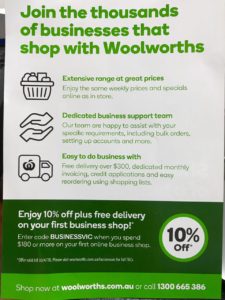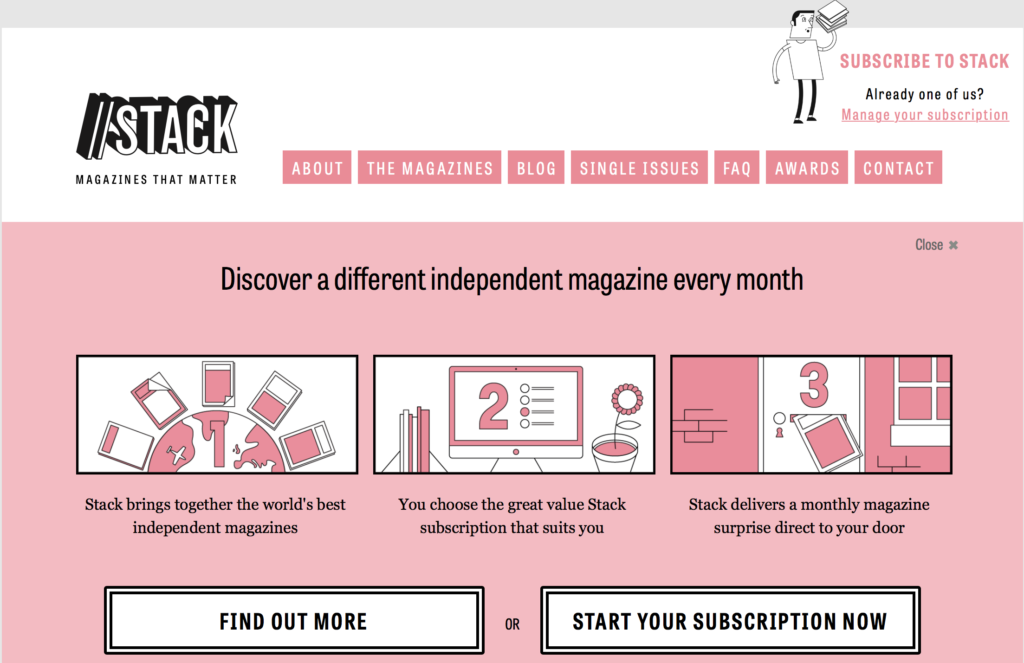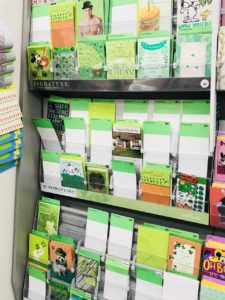Newsagents off the radar
There was a time trading hours of newsagents mattered. Not in The Age today or the Herald Sun, because times have changed. Businesses that are part of everyday are listed.
There was a time trading hours of newsagents mattered. Not in The Age today or the Herald Sun, because times have changed. Businesses that are part of everyday are listed.
 I received this A5 double-sided flyer from Woolworths at my software company Monday this week. It is another piece of business to business marketing from them, the second I have received this year already.
I received this A5 double-sided flyer from Woolworths at my software company Monday this week. It is another piece of business to business marketing from them, the second I have received this year already.
Promoting to local businesses is important. As Woolworths shows in their offer, the actual offer does not need to be substantial. The most important part of the business to business offer is ease of transacting.
Make it easier for local businesses to get supplies from you and you are more likely to get the business.
I like the idea of a professional flyer as it is a low cost way to reach businesses in an area. If you decide to go this route, the flyer had to be professional, contain an engagement offer and easy to read and understand.
I know of newsagents who visit local businesses, pitching for their business. While I think a personal touch like this is important, it is not as efficient as a flyer pitch where you can reach many businesses for a lower cost. Does this mean you should stop visiting? No! Add a flyer to the marketing mis and maybe this will lift the success rate of your business visits.
If I was doing a flyer like this in my business, my flyer would pitch:
The flyer would be different to the slick corporate flyer from Woolworths. I’d try and tap into the local small business emotion without being ham-fisted about it.
I think this type of flyer is vital for retail businesses in the high street, not in a busy shopping mall. These high street businesses often have a traffic challenge already. The flyer is a vital way of reaching outside the business to find those valuable new shoppers. A business is a very valuable new shopper.
The Woolworths flyer was, to me, a reminder that all businesses need to promote their businesses outside their business, to reach out and attract new shoppers, some of whom will never actually personally shop in the business.
Warning because here comes a newsXpress pitch: The newsXpress newsagency marketing group provides a flyer template for its members, so they can create a personal, professional, flyer in a couple of minutes for their business without any graphic design skills. This is what marketing groups do to help newsagents find new shoppers.
Stationery, particularly pens and pencils, is being pitched in many different ways that challenge the traditional newsagency approach. Some of the new ways are successful at getting people to purchase stationery for purposes other than immediate use, this is brilliant.
It can be through display, packaging or tactical placement that pitches stationery differently to what we usually see in a newsagency business. And on the packaging, plenty of alternative options are available if you go outside suppliers to the newsagency channel looking for options.
I your stationery sales are flat or declining, maybe it is time to pitch stationery not as stationery.
Non-traditional approaches I have seen in recent weeks include some in the following photos. None of the photos is from a newsagency type or similar business. They are all from gift and fashion stationery. All overseas.
These photos are not placed here to suggest you stock the lines. rather, they are offered to show opportunities outside of what may have been traditional for your type of business. They are six from more than fifty photos from this series:
news.com.au reports:
In a statement, Lottoland Australia CEO Luke Brill said, “While we understand the concerns expressed by some newsagents, the proposed legislation is both misguided and unnecessary.
“The fact is that Lottoland does not offer betting opportunities on any Australian lottery, so our offering does not have a direct impact on newsagents.
“On the contrary, we want to work with newsagents to provide customers with greater choice and even better services, which have the potential to be highly beneficial for individual newsagents.
“As a responsible and responsive corporate citizen that contributes extensively to local and community groups, we will continue to work closely with regulators and all political parties to reach a satisfactory outcome in the best interest of our more than 650,000 registered customers.”
Big news in this press release from ALNA today:
Australia, 27 March 2018: The lotto and keno betting industry will cease to exist under a new proposed amendment to the Interactive Gambling Bill, meaning the closure of dangerous sites like Lottoland and Planet Lottery – a move welcomed by the Australian Lottery and Newsagents Association.
The news comes as a relief to the Australian Lottery and Newsagents Association (ALNA), which has long held serious concerns about the ethical conduct, high consumer risks, damage to Australian businesses, and dodgy structures of these schemes.
Adam Joy, CEO of the Australian Lottery and Newsagents Association said, “We are pleased to see this loophole being addressed on a national level. The best kind of consumer protection from synthetic lotteries is to not allow it in our country. The model encourages problem gambling, promotes high risk spending, and is misleading regarding the winnings available. And it also comes at a significant cost to state taxes, and to local family-run small businesses – that employ locally, pay Australian taxes and support the local community.”
Betting on the outcome of lotteries is already not an approved betting contingency in South Australia, so lotto betting schemes cannot accept bets there. The UK government has recently moved to close further loopholes in their Gambling Act, to ensure betting on lottery outcomes is prohibited. And now this proposed amendment will see decisive national action to prohibit these types of businesses in Australia.
Joy added, “We are talking about websites, like Lottoland, that send bets overseas and have a history of being misleading, preferring token gestures over responsible behaviour, of targeting Australian businesses, of illegally misusing trademarks of other businesses and facing legal action. They operate on the methodology that it is easier to beg for forgiveness than to do the right thing from the start.
“And they do all this while operating outside of the much tighter regulations, consumer protections, and higher taxes that official regulated lotteries adhere to. This is why amending the Interactive Gambling Act is the only sensible way forward.
“This will be welcomed news for the consumers who have been misled by these online schemes, the community that have been concerned about the impact on state tax revenues, and the more than 4,000 small businesses and their 15,000+ employees that are regulated lottery retailers.”
One of the most concerning aspects of the synthetic lottery model is its introduction of instant and repetitive behaviours that have been proven to be high risk for addiction and encouraging of irresponsible gambling behaviours: “The same features of pokies that make it high risk and dangerous, are being applied to online betting. All the while, using the low harm product of lotteries as the bait to then switch Australian consumers over to high harm gambling.
“The Federal Interactive Gambling Act already makes it illegal to sell a scratchy online and play a poker machine online, and the federal government moved last year to further strengthen the act with an amendment to ban online in-play betting on sports and banning credit betting, as well as making it illegal for unlicensed operators to offer online poker. We are pleased that they are now closing a further loophole in the Act by banning online betting on all lottery and keno outcomes,” explained Joy.
The ALNA has objected to the financial implications of these online betting sites, like Lottoland and Planet Lottery. Based offshore and licensed in the Northern Territory as sports bookmakers, the schemes avoid paying any gambling tax and have no obligation to support the consumers they may hurt with their encouragement of high harm behaviour. And in the case of Lottoland, a Point of Consumption Tax for all synthetic lottery sales would be contributing less than 1% compared to official lotteries.
The ALNA questions if the current licence for these sites can manage the risks that come with the type of complex layered financial hedging that they operate on.
The other concerning financial implication of lotto betting has been that consumers can walk away with significantly less than what was initially promoted or than they had understandably expected if they won.
Joy added, “State Governments have been voicing concerns that lotto and keno betting sites are hurting state tax revenue collections that impact community services that pay for schools, hospitals, roads and other important infrastructure.
“These schemes are also hurting newsagents and other lottery retailers across Australia who are mostly mum and dad operators and have their houses on the line as collateral for their businesses. And because they are bound by tight regulations that provide consumer protections, they are open to having their customers hijacked.”
On behalf Australia’s lottery and news agents, the ALNA greatly appreciates the Coalition Government’s strong support and decisive action on this issue, and would also like to recognise the important role of Senator Pauline Hanson and the One Nation Party in leading this initiative with the government.
– ENDS –
What is the difference between lotto betting and official regulated lotteries:
Lotto betting sites are wagering websites that sends bets overseas, with customers betting on the outcome of lotteries. More colloquially known as lotto bets (synthetic/fake lotteries), these online-only bookmakers are different to official regulated lottery draws.
They do not offer tickets in a draw, rather they draw from regulated lottery businesses and offer bets on lottery outcomes, relying on complex insurance linked securities to pay any winners (there has only been one million-dollar prize recipient, compared to official lottery’s 253 millionaires in 2016).
Real lotteries generate billions in state lottery taxes to pay for schools, hospitals, roads and other important infrastructure.
About the Australian Lottery and Newsagents’ Association (ALNA)
The Australian Lottery and Newsagents’ Association (ALNA) is the only national and non-profit, industry body specifically for Australian newsagents and lottery agents. Representing a significant part of the Australian economy, ALNA works tirelessly to better its members businesses, and to ensure a secure future for newsagents and lottery agents.
About Adam Joy, Chief Executive Officer, ALNA
Adam Joy is the Chief Executive Officer of the Australian Lottery and Newsagents’ Association (ALNA). He has held senior roles at ALNA for almost a decade.
Adam is an experienced senior executive and board director in commercial, advocacy and non-profit organisations. Previously, he worked in business process outsourcing, petrol and convenience, FMCG, QSR and marketing organisations.
Adam holds a Masters in Leadership and is a member of the Australian Institute of Company Directors.
As a result of a promotion in the group there is an opportunity at newsXpress Southland in a store manager role. I am looking for someone keen to lead and leverage the excellent work already done in the growing business. This is 80% a gift and collectibles shop. No lotteries. No tobacco. If you know someone who may be interested, please have them email me at mark@newsxpress.com.au.
 Stack is a fascinating business, one we newsagents should take note of. Stack costs £7 per month. For that they will send you a different independent special interest magazine each month. It is a fascinating model, one that I think could work here in Australia.
Stack is a fascinating business, one we newsagents should take note of. Stack costs £7 per month. For that they will send you a different independent special interest magazine each month. It is a fascinating model, one that I think could work here in Australia.
Their website is excellent, pricing good and pitch compelling. They have done an excellent job creating an offer for people who love the magazine medium and those who buy gifts for those people.
The challenge for us is that if they get this right and if it travels further afield, the specialisation of our businesses in the rich magazine space will be challenged. While they do ship internationally today, it is not obvious and not easily found through a Google search in Australia, yet.
The CEO explains the motivation behind developing the service:
I started Stack because I think people want something better to read. There are piles of fantastic magazines out there just waiting to be discovered, and Stack makes it cheaper and easier than ever for people to find and enjoy them.
Finding quality independent magazines can be difficult – most people don’t live near a great magazine shop, and there are so many options online that it’s easy to get lost amongst the pixels. Stack acts as a filter, selecting the best independent titles and supplying them at the best price via our subscription service and our weekly Sampler offers.
Their pitch on their about page is excellent:
It’s a surprise!
Every month that big brown envelope will thump onto your doormat, containing one of the world’s best independent magazines. You never know what you’re going to get next, but you do know it will be a beautiful, intelligent magazine you probably wouldn’t otherwise have come across.It’s top quality
The magazines we send out mix quality writing with cutting-edge design and the most exacting production values to guarantee that you’ll want to keep them on your shelf long after you’ve finished reading.It’s great value for money
We want the best magazines to be available to all so we keep our prices low – a subscription to Stack costs £7 per month, or even less if you sign up for an annual plan. Most Stack titles cost £10 or more in the shops, so you could have them delivered to your door while saving more than 30% off the cover price.It’s totally up to date
We only send out the current issue of any magazine, so you can be sure you’re right up to date with the latest independent publishing. Every delivery comes with a letter from me, explaining why I picked the magazine and telling you more about it, giving you an extra glimpse into the world of independent publishing.And it makes a great gift
Buying Stack as a gift subscription is a great way to tell somebody you think they’re an interesting person who looks beyond the mainstream. Sign up for somebody else and we’ll start you off with a gift card you can give to them before the magazines arrive.
Of course, this risk of writing about this here is that it pitches Stack to indie magazine publishers who are looking for other routes to market. I’m okay with that as Stack is a sampler offer. The more people buying special interest magazines the better for us.
With AFL cards set to his your Gotch account in one chunk and in a way that is financially unfair to newsagency businesses, early returns of magazine titles not currently paying their way, of that have been oversupplied, is one way to mitigate the impact on cash flow.
To the magazine publishers concerned about this – the Gotch approach leaves newsagents no choice.
I bought a $20 Powerball ticket in Seattle Friday last week and filmed it, so you can see how easy it is and how they do the age check.
 Earlier this week, Australia Post promoted Click Frenzy Junior, an online only sales and marketing event for online business partners of Australia Post. It is a partner event to the bigger Click Frenzy, the main event run online.
Earlier this week, Australia Post promoted Click Frenzy Junior, an online only sales and marketing event for online business partners of Australia Post. It is a partner event to the bigger Click Frenzy, the main event run online.
Since it was the first time for this event, noise on social media was small. I suspect sales were small too. You have to start somewhere.
This event is on of plenty of online only marketing events, reaching out to prospects purely online with no representation in-store of the online offer.
I mention this today as another example of competitor sales event marketing that you in competitive retail may never see. The campaign was targeted by Australia Post to focus on brands that partner with their online fulfilment platform.
Plenty of retailers I speak with say that they are not affected by online that much. This is a common comment among regional and rural retailers. The reality is quite different to this perception.
Talk to any major online business in Australia and they will tell you the geographic coverage of sales is in line with population spread.
I appreciate it may feel too hard to compete online. That should not be a barrier to having a crack.
Doing nothing online is no longer an option for high street retailers.
While the takeaways from the Shoptalk conference are considerable, here are some early insights I’d like to share here as I think they are relevant to newsagents:
Many years ago newsagents and many other retailers placed high importance on technology for the back room of the business. Typically, it was used for arriving new stock, doing returns, running reports and general management.
Today, I see little value in a retail business like a Newsagency for technology in the back room. This is something I have said here and elsewhere for some years.
At the massive Shoptalk retail conference in Las Vegas this week I was in a session where this was a focus call to action to retailers – to shops tech investment from the back room to the shop floor.
In my own shops we have done this for some years, moved to the shop floor work usually done in the back office. All product arrival, product returns, reporting and day to day management is done from the shop floor and sales counter.
By doing work somewhere on the shop floor that you might otherwise do in the back office you immediately increase the opportunity for shopper interaction. More opportunities for shopper interaction = more sales in most businesses.
A shopper can’t ask you a question in the back office.
A shopper will not notice new product you are arriving, unpacking and pricing in the back office.
These are just two tasks you can move to the shop floor and easily boost business as a result.
At Shoptalk examples were presented off retailers systematically moving back office tasks to the shop floor and tracking sales growth as a result.
Key to doing this is your tech investment, ensuring you have the right tech for the tasks so that it does not intrude on or hinder the shopper experience. Indeed, the right tech will enhance the shopper experience and enable efficient execution of the work on the shop floor.
In a newsagency, the tasks that could be shop floor or counter (and not back office) tasks include: product arrival, pricing and returns, reporting, ordering, supplier queries, rostering and more.
It is vital we change how we work in our businesses, seizing every opportunity possible to increase shopper engagement on their shop floor, and to embrace this with delight. Shoppers will reward you with sales growth.
Footnote: A common message I hear from retailers is surprise that shoppers purchase items they are unpacking on the shop floor. The thing is, once retailers experience this, they do it more, seeking that impulse purchases are repeated.
I have revised my previous Easter marketing ideas and offer them here for retailers looking to take a different, non-traditional) approach to marketing this season of increasing value:
Easter is considered by many to be a small season. I see it as full of opportunity and primed for fun in the newsagency.
 I have been contacted by two newsagents in the last week about them receiving fake $50 notes in their businesses. Both are from New South Wales, but hours apart.
I have been contacted by two newsagents in the last week about them receiving fake $50 notes in their businesses. Both are from New South Wales, but hours apart.
The reserve Back website has excellent details on how to spot fake Australian banknotes. I urge you to print this and ensure all team members have read and understand it.
 I am grateful for the opportunity to spend St Patricks Day 2018 in New York. It was fun, loud, sloppy and memorable.
I am grateful for the opportunity to spend St Patricks Day 2018 in New York. It was fun, loud, sloppy and memorable.
In retail, it was good to see the range of celebration products available, including greeting cards. In many stores they were sold out. The photo is from a large CVS (drug store) near my hotel, taken two days before. See the extent of the space allocated.
The range of captions offered was broad.
It is a massive day here and the city is 100% behind it, along with retailers. Stores and team members were dressed, to identify with the occasion. I am not suggesting we can do this in Australia, my interest is more about the extent of support in retail for a city-wide celebration.
It was only when I got to see the march that I understood the extent of support for this emotional and celebratory day in the calendar.
The post on green shoots being experienced by some newsagents has a small group of people in a lather.
The reality is that what transacts under a newsagency shingle has changed dramatically for many in recent years. So mush so for some that the shingle is almost all that remains of the old business.
Online is a big factor for many. In a typical business with a good online presence, online revenue accounts for less than 25% of the revenue generated by a website with 75% being transacted in-store thanks to what people discover from the store’s online site.
What is selling online? Plush, gifts, homewares, books, collectibles, pop culture and plenty more.
 This image shows sales data, transaction count and revenue, from online sales achieved by some newsagency businesses. It is a selection mid way through a report of sales for the last year from one of seven different websites for online connected newsXpress businesses.
This image shows sales data, transaction count and revenue, from online sales achieved by some newsagency businesses. It is a selection mid way through a report of sales for the last year from one of seven different websites for online connected newsXpress businesses.
The numbers are online revenue from this one website, selling one product category, and do not reflect in-store revenue where shoppers use the site to inform in-store purchases they make.
Almost every sale was to someone who had not shopped with the shop before.
My core point here is: what newsagents sell, how they sell, when they sell and to whom they sell has changed and will continue to change. Being online engaged is key. This is one reason I say any newsagent can grow their business – with the right strategies and tools.
I have heard from several newsagents in recent weeks of issues with IPS an, in particular, data. My understanding is that IPS has been no help in resolving the matters. I have posted this, here, so people may comment about their experiences with IPS.
Further to my earlier post about the toy opportunity, Toys R Us has announced all US and UK stores will close. Toy retail around the world will be impacted.